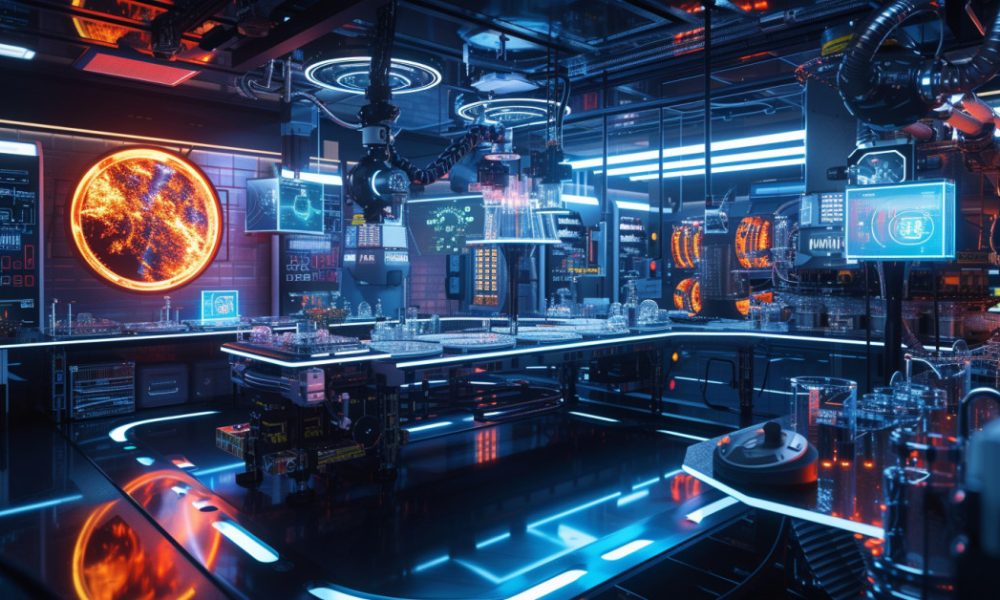The University of Amsterdam has recorded an important milestone in the field of chemistry with the introduction of RoboChem, an innovative autonomous chemical synthesis robot. RoboChem, developed by Professor Timothy Noël’s group at the UvA’s Van’t Hof Institute for Molecular Sciences, is a pioneering work that shows the potential to dramatically accelerate chemical discovery in medicine and a variety of other applications.
It was published in the magazine science, the first results of Robochem’s operations highlighted its unique ability to outperform human chemists in terms of speed, accuracy, and ingenuity. This development heralds a new era in chemical research, where autonomous robots could play a central role in advances in molecular discovery.
RoboChem’s operational excellence and efficiency
At the heart of RoboChem’s innovation is its unparalleled ability to perform a variety of chemical reactions with incredible precision and, above all, with minimal waste. This autonomous chemical synthesis robot has redefined the efficiency of chemical experiments. RoboChem works continuously, delivering results quickly and energetically. This is a feat no human chemist can accomplish.
Professor Noel says, “We can optimize the synthesis of about 10 to 20 molecules in a week, which would take a PhD student several months.”
Such efficiency not only means a dramatic increase in the speed of chemical synthesis, but also a dramatic increase in the amount of work that can be accomplished. Unlike traditional processes that require extensive manual labor and time, RoboChem’s autonomous capabilities can handle tasks around the clock without fatigue or errors, greatly accelerating the pace of chemical discovery. Masu.
The effectiveness of RoboChem is further highlighted by its ability to not only determine optimal reaction conditions but also provide insights to scale up the process. This aspect is particularly important for industries such as pharmaceuticals, where fast and efficient production of compounds is essential. “This means we can produce quantities that are directly relevant to suppliers in the pharmaceutical industry, for example,” Noel added. The integration of such autonomous systems in chemical synthesis heralds a new era in the field and opens the door to rapid innovation and discovery.
An overview of the RoboChem system and its main components. Image: UVA/HIMS.
Innovation in the integration of flow chemistry and AI
RoboChem represents a major advance in the field of flow chemistry, a modern approach to chemical processes. This innovative method replaces traditional beakers and flasks with a system of small flexible tubes, revolutionizing the way chemical reactions are performed. At the heart of RoboChem’s operation is a meticulously designed robotic needle that collects and mixes starting materials precisely and in small quantities. These materials are then routed through a piping system towards the reactor.
Inside the reactor, light from a powerful LED is used to initiate the conversion of molecules and activate the photocatalyst in the reaction mixture. This approach to chemical reactions that harnesses the power of light represents a significant shift from traditional methods and provides a more controlled and efficient process.
The integration of AI and machine learning algorithms is what truly sets RoboChem apart. As the converted molecules flow toward an automated NMR spectrometer, the resulting data is fed back in real time to the computer that controls RoboChem. “This is the brains behind Robochem,” explains Professor Noel. “We use artificial intelligence to process the information. We use machine learning algorithms that autonomously decide which reactions to perform.”
RoboChem’s AI-powered machine learning unit is constantly refining its understanding of the chemistry involved. Aim for optimal results and adjust your strategy based on feedback from ongoing reactions. This self-improvement mechanism allows RoboChem to not only replicate existing chemical processes, but also discover new ones, demonstrating an amazing level of ingenuity and precision in chemical experiments.
The meaning and future of AI in chemical discovery
RoboChem’s emergence as a chemical synthesis robot not only demonstrates technological capabilities but also highlights an extraordinary level of ingenuity in the field of chemistry. Professor Noel reflected on the robot’s performance, noting its ability to identify unconventional reactions that even the most experienced chemists could not predict. “I have been working on photocatalyst research for more than 10 years. Still, Robochem showed results that I could not have predicted,” he said. This ability to explore uncharted territory in chemical reactions exemplifies the potential of AI to push the boundaries of scientific discovery.
Comparing RoboChem’s results with previous studies further solidifies its efficiency and accuracy. According to Professor Noel, “In about 80% of cases, this system produced better yields. The remaining 20% had similar results.” This high success rate confirms that AI-assisted tools like RoboChem have the potential to have a transformative impact on the entire field of chemical discovery.
Looking to the future, the impact of AI-powered robots like RoboChem will extend far beyond individual discoveries. These innovations herald a new era in chemical research, where AI will play a pivotal role in generating comprehensive, high-quality data. Such data is critical for future AI applications in chemistry, as it provides deeper insight and a more holistic understanding of chemical processes. Furthermore, the inclusion of “negative” data, which is the result of failed experiments, represents a paradigm shift. Traditionally, scientific literature has focused primarily on successful experiments, leaving gaps in knowledge. RoboChem’s approach to recording both positive and negative results enriches the dataset available for AI-enabled chemistry and paves the way for more important breakthroughs in the field.
As AI continues to be more deeply integrated into chemical research, its role in improving our understanding of molecular interactions and reactions will become increasingly important. Advances led by RoboChem and similar technologies will not only accelerate the discovery of new molecules and processes, but also revolutionize chemical research methodology, making it more efficient, accurate, and comprehensive. i promise. This change in approach and the resulting wealth of data holds immense potential for future innovations, ushering in a new chapter in the synergy between artificial intelligence and chemical discovery.


